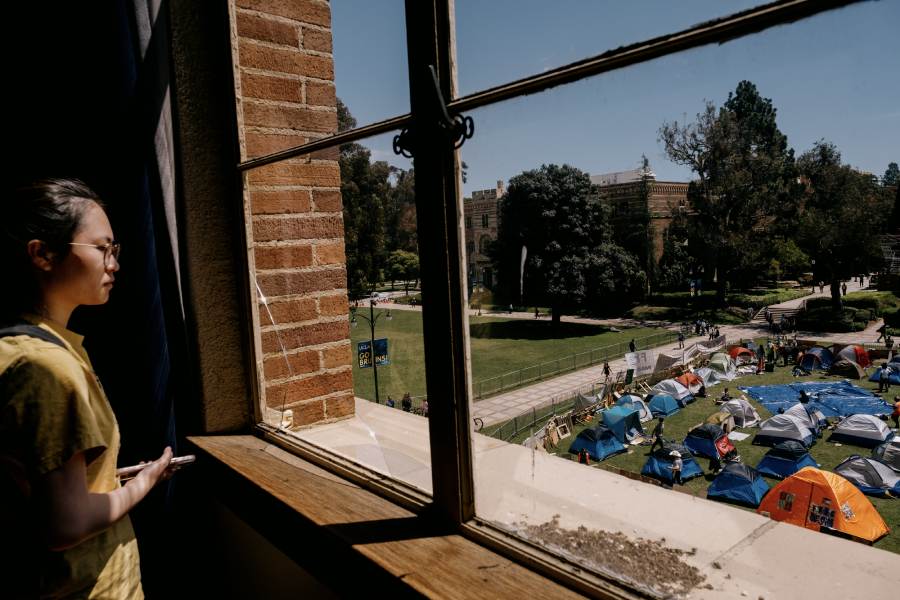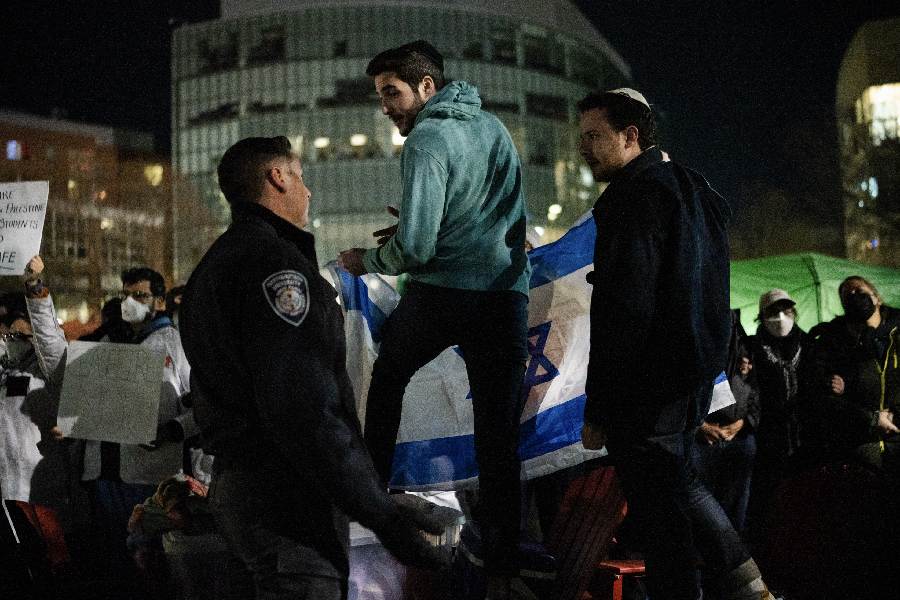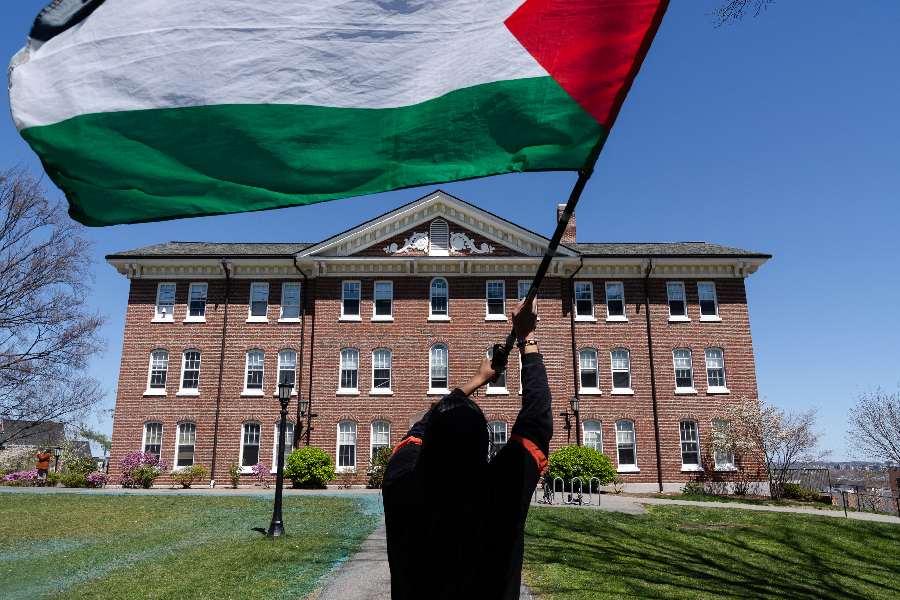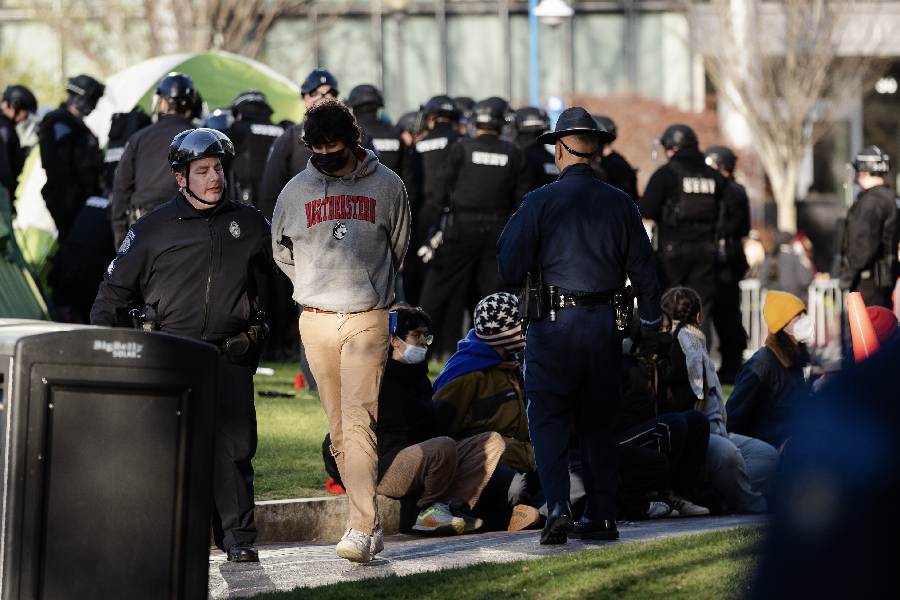Nearly 200 protesters were arrested Saturday at Northeastern University, Arizona State University, Indiana University and Washington University in St. Louis, according to officials, as colleges across the country struggle to quell growing pro-Palestinian demonstrations and encampments on campus.
More than 700 protesters have been arrested on U.S. campuses since April 18, when Columbia University had the New York Police Department clear a protest encampment there. In several cases, most of those who were arrested have been released.
At Washington University in St. Louis, the campus was locked down amid protests and several arrests were made Saturday evening, according to campus police and updates on the university website. Jill Stein, the Green Party candidate for the 2024 presidential election, was among those arrested, along with her campaign manager and another staff member, a spokesperson for the campaign said. It was not immediately clear how many people were arrested.

Mark Abramson/The New York Times
Earlier in the day, at Northeastern in Boston, protesters had set up an encampment on the campus’s Centennial Common this past week that drew more than 100 supporters. The administration had asked the protesters to leave, but many students did not.
Around dawn Saturday, Massachusetts State Police officers arrived at the encampment and began to arrest protesters, putting them in zip-tie handcuffs and taking several tents down. They said they had arrested 102 protesters. It was unclear how many of those arrested were students, but the university said students who showed their university IDs were being released.
A Northeastern spokesperson, Renata Nyul, said the demonstration had been “infiltrated by professional organizers” and that the “use of virulent antisemitic slurs, including ‘Kill the Jews,’ crossed the line.”

A police officer appeals to Jewish counter-protesters to disengage with pro-Palestinian students at their protest encampment on the campus at Northeastern University in Boston, Mass., on Friday, April 26, 2024. Sophie Park/The New York Times
Protesters denied both claims, and a video appeared to show that it was a pro-Israel counterprotester who used the phrase, as part of his criticism of the pro-Palestinian protesters’ chants. In response to that video, Nyul stood by her initial comments, adding that “any suggestion that repulsive, antisemitic comments are sometimes acceptable depending on the context is reprehensible.”
After protesters had been removed from the encampment by police and then handcuffed and brought into a nearby building, they moved to block a nearby alley where police vehicles were parked. They cheered in support when one of the arrested protesters — wearing a Northeastern sweatshirt — waved through the building’s windows with zip-tied hands.
Alina Caudle, a sophomore at Northeastern University, reiterated the protesters’ demands that the university disclose its investments and divest from companies that protesters view as supporting Israel’s war in the Gaza Strip.

A demonstrator waves the Palestinian flag during a protest rally and march to demand a ceasefire in Gaza on the campus of Tufts University in Medford, Mass., on Friday, April 26, 2024. Sophie Park/The New York Times
“We want them to divest our money that we’re paying for our tuition,” Caudle said. “Our administration is not listening to us.”
Caudle said she believed the vast majority of students in the encampment were Northeastern students, along with a large amount of Jewish students and faculty supporting the protest.
By 11 a.m. Saturday, the majority of the encampment was cleared. A moving company had been brought in to load up the tents, snacks and other items that had been scattered throughout the grounds.
The mass arrest at Northeastern was the second early-morning crackdown on protesters at a Boston campus in less than a week. Early Thursday, Boston Police officers arrested 118 people at Emerson College after protesters refused to move and formed a barricade.
More than 2,500 miles away, at Arizona State, school police arrested 69 people early Saturday after they set up an unauthorized encampment, which was in violation of university policy, school officials said.
The school said that the protesters had created an encampment and that the group was instructed multiple times to disperse.
“While the university will continue to be an environment that embraces freedom of speech, ASU’s first priority is to create a safe and secure environment that supports teaching and learning,” school officials said in a statement.
Three people were also arrested at the school in relation to a protest Friday, officials said.
At Indiana University Bloomington, where university police had arrested 33 people at an encampment this past week, campus and state police arrested 23 more protesters Saturday. Officials said a group had “erected numerous tents and canopies on Friday night with the stated intention to occupy the university space indefinitely.”
Schools across the country have used differing strategies over the past week to tamp down protests. Some have backed off and sought to de-escalate tensions, while at other colleges, like the University of Southern California and Emory University, police have rushed in to break up encampments and arrest students and faculty members, among others.
At some demonstrations, there were some reports of injuries, but in many cases, the arrests have been peaceful, and protesters have often willingly given themselves up when officers moved in.
On Saturday, there appeared to be increased police presence on several campuses, though not all of them have made arrests. At the University of Pennsylvania, more than a dozen campus police officers were stationed along barricades, with more than 100 protesters in an encampment and about a dozen pro-Israel counterprotesters across the campus walk.
Across the country at the California State Polytechnic University, Humboldt, officers were stationed all over the now-closed campus after protesters occupied two buildings this past week. About three dozen protesters were inside an encampment.
Beyond arrests, schools are using other measures to apply pressure.
At Harvard, access to its historic Harvard Yard was restricted, allowing in only those who showed a university ID. The university also suspended a pro-Palestinian group, but the group and its supporters set up an encampment in the yard nonetheless.
On Saturday, Harvard’s dean of students sent an email to the student body warning that anyone participating in the encampment faced discipline. But there was no sign of any impending police operation.
At Cornell University, the student newspaper, The Cornell Daily Sun, reported Friday that four students connected with the pro-Palestinian encampment on campus had been suspended from the school. Cornell officials confirmed the suspensions were issued but declined to provide a number.
In a statement Saturday afternoon, the university’s vice president for university relations, Joel Malina, said that the school had asked the protesters to move to an area “where noise would not disturb classes” and where people could easily avoid the encampment, but he said that offer was rejected.
Malina also said the university was prepared to issue additional suspensions, “as well as referrals to HR for employee participants.”
Nick Wilson, a student who said he was among those suspended, said in an opinion article for The Cornell Daily Sun that he and others had been withdrawn from their current courses and that they were not allowed on campus. Still, he wrote, the suspension “in an odd way” gave him hope. By his reasoning, institutions like Cornell would not have suspended him and others “unless they truly fear our movement may succeed.”
The New York Times News Service











